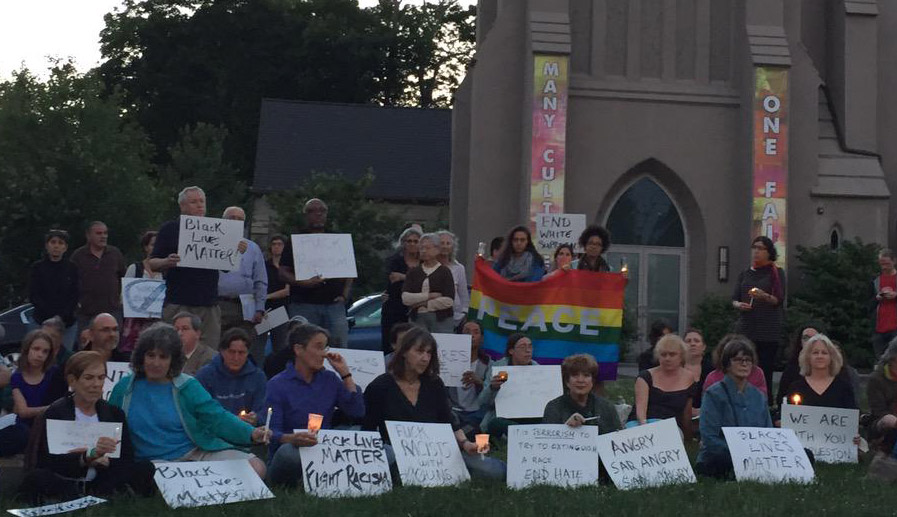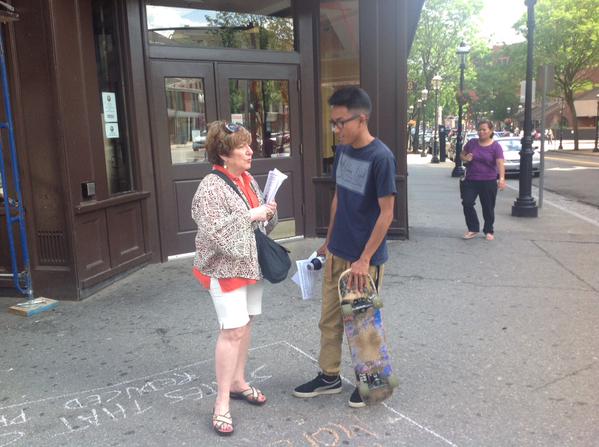Most activists hope that if we take steps to make change, we are helping to create new policies or programs, and along with them, more social justice. And I am no different. I want to see laws changed, and advocate, write, and blog in order to accomplish as much as I can.
But this week I had the occasion to see how activism matters, not only for these reasons. It matters because taking action is often what we must do, we are compelled to do, because on a personal level, if we don’t do something to stand up for what we believe in, it will not feel right in our bones.
When the massacre occurred in Charleston and the nine African American men
nine African American men
Photo courtesy of Universal Hub. I am 4th from the right.
and women were slain while praying, I wanted to do something to speak out against hate, racism, and what I see was an act of terrorism. The First Baptist Church in Jamaica Plain was having a silent vigil on June 18th, the evening after the murders, and thanks to Jason Lydon, founder of Black and Pink, I heard about it on twitter. It didn’t matter that I live 45 minutes away. I needed to be with like minds and hearts.
When I arrived at the church, I found a very inclusive congregation where diversity is welcomed. The pastor, Rev. Ashlee Wiest, was asking people who had gathered on the lawn to make signs. The signs were to suggest our feelings or thoughts about the massacre. I was so filled with feelings, I had to create two signs to express them. Some people lit candles, and others huddled together. Without speaking, we faced the street, so buses and people walking by could stop or see our expression of grief and outrage, and so others might join us. The Reverend eventually spoke eloquently about racism and its relationship to mass incarceration, about the tyranny of the Confederate flag, and about the need to end hate. She pledged to keep up all the signs in the church. Later, I learned she had marched in Ferguson after Michael Brown was killed.
But her words, while causing most of us to tear up, were not the main lesson of the evening.
We all sat together in silence. No cellphones. No computers. No loved ones calling to us. Nothing but a community of mourners, all speaking loudly through our pain and our signs, saying that we will not stand idly by. As I watched people staring at us, stopping to take our photos, nodding somberly, or giving us the thumbs up, I knew that the alleged killer, Dylann Roof, does not define the America I stand for. We were a force, those seventy-five or so of us, and we had power in our intent to right wrong.
This was echoed today by President Obama in his eulogy when he talked of grace and its power: “As a nation out of this terrible tragedy, God has visited grace upon us for he has allowed us to see where we’ve been blind….Removing the flag from this state’s capital would not be an act of political correctness. It would not an insult to the valor of Confederate soldiers. It would simply be acknowledgment that the cause for which they fought, the cause of slavery, was wrong.”
I drove home that night with hope in my heart.
Then, a few days later, on June 23rd, I joined another group action. Only this time, I was doing it by myself, in another part of the state. It was an action to bring attention to the barbaric practice of solitary confinement. While the Coalition for Effective Policy of which I am a member, was in downtown Boston, chalking the size of a cell, and writing facts about the brutal 23 out 24 hours that most in solitary are confined daily, I did the same in Lowell.
 I felt totally connected to my cohorts in Boston when I handed out leaflets, chalked the cell, and talked about the horror of Massachusetts being one of three states that allows people to stay in solitary for up to ten years. I met people who had been in solitary, a man from the organization called “Neighbor to Neighbor,” who was involved in his own brand of activism, an attorney who said “I’ve put 100s in there,” (and proceeded to brush me off), someone who told me “Stay in that cell,” many who were sympathetic, a few who promised to call their legislators, and dozens that took the flyers, read them, and said that they agreed. There were a few who stopped and engaged me in conversation like the young student skate-boarder above. It was activism because it was education; awareness can lead to change.
I felt totally connected to my cohorts in Boston when I handed out leaflets, chalked the cell, and talked about the horror of Massachusetts being one of three states that allows people to stay in solitary for up to ten years. I met people who had been in solitary, a man from the organization called “Neighbor to Neighbor,” who was involved in his own brand of activism, an attorney who said “I’ve put 100s in there,” (and proceeded to brush me off), someone who told me “Stay in that cell,” many who were sympathetic, a few who promised to call their legislators, and dozens that took the flyers, read them, and said that they agreed. There were a few who stopped and engaged me in conversation like the young student skate-boarder above. It was activism because it was education; awareness can lead to change.
Sometimes, knowing that people are committed with you, even if they are not standing or sitting along side of you, is enough. I needed to connect to my deeper self this week, and imagine I was not alone in that quest.
